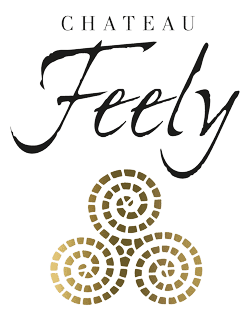POD 5: Organic farming and winegrowing
Wine growing is essentially grape farming. Like all farmers we are concerned about four key things:
- fertility of our soil
- competition from other plants
- pests
- diseases
As organic farmers we cannot use short term systemic chemical solutions to solve these problems we must find natural ways that offer long term solutions instead. In this section we’ll talk about what we do instead and how nature helps us with things like mycorrhizae.
Natural fertility
Natural Fertility
To keep our soil fertile, we use natural fertilisers like green manure and animal manure. You can see clover growing in the vineyard, this is a great nitrogen fixer and hence what we call a ‘green manure’. Biodynamic compost and the biodynamic 500 or 500P preparation based on cow dung are also natural animal manure fertilisers.
Natural goodness instead of the negative reinforcing circle of chemical fertiliser
Chemical fertilisers are made with mineral salts that make the vines thirsty, the vines then take up more water and hold more water in their cells, just like us if we eat too much salt. For the vines too much water retention creates fungal disease, so the vines get sick.
A vine that has been fed chemical fertiliser will be darker green than its organic neighbour because of this excess water.
Chemical fertilisers offer a quick fix increase in yield. They are like steroids. Good for a quick boost but bad for long term health. Chemical fertilisers also contain a potassium dose that means the chemically farmed vines create lower natural acidity in their grapes and hence in the finished wine, so they need acid added and / or more sulphites.
Vines create 94% of their dry matter from what they get from the sky: sun, air and moonlight. By giving them chemical fertiliser, we make them lazy, they don’t need to do the exercise they usually do to get their food from the sky, we turn them into couch potatoes and set them up to be sick.
Systemic fungicides stop beautiful wild orchids and delicious truffles from growing and are dangerous for human health. They also stop the vine’s natural access to nutrients offered by their symbiotic relationship with mycorrhiza, essential soil fungi. This weakened access to natural food in the soil means more chemical fertilisers are required to achieve the same yield and so on in a never-ending vicious circle that ends with a desert instead of a farm.
Mycorrhizae: wild orchids in the vineyard a sign of soil health
Beautiful wild orchids flower in Feely vineyard. They are a sign of a healthy living soil. Orchids are dependent on mycorrhizae, a special fungus that develops on the root systems of 95% of plants tested to date and helps them access nutrients in the soil. This mutually beneficial relationship came about more than 400 million years ago. The mycorrhizae stock and distribute water and nutrients to the plant in exchange for carbohydrates, sucrose and glucose from the plant’s photosynthesis. They also act as a communication network between plants. Research shows that mycorrhizal networks transport carbon, phosphorus, nitrogen, water and defense compounds – compounds that combat attack by something, from plant to plant. They are especially beneficial for plants in nutrient poor soils. The best wine grapes are grown on relatively poor soil so it is particularly relevant for us winegrowers.
These magic mushrooms will not develop in chemically farmed soil because of systemic fungicides.
The wild orchids at Chateau Feely came back after three years of organic farming. It was a great indicator that the three years required for organic conversion is a good time scale and that the farm was totally clear of the systemic fungicides that had been used before the Feelys arrived. The mycorrhizae are even more developed in biodynamic plants than in purely organic and are part of the secret to being able to farm successfully without chemical fertiliser and ‘icides. Using the preparation 500P helps to develop the life of the soil and the mycorrhizae.
Systemic fungicides are bad for us humans. They get into your wine since they are ‘systemic’ they go inside the plant and inside the fruit and can’t be washed off.
Mechanical weeding and mowing instead of herbicide
We control the competition in the vineyard by mechanical weeding with an under-vine cultivator and then mowing between the rows. If we did nothing, we would have a forest not a vineyard. But those plants that we consider ‘competition’ or ‘weeds’ are part of our biodiversity. They play multiple roles: mineral fixing, like clover for nitrogen; aerating the soil, for example wild grasses; attracting insects, for example angelica. They also hold the earth together and stop it from eroding and provide natural air-conditioning keeping the earth cool when it’s hot and warm when it’s cold and managing the rain and moisture.
Avoid the erosion and health hazards of herbicides
Most conventional farmers use a range of herbicides to remove other growth that could be competition to their crop. Two types of herbicide are often applied: one to kill the plants that are already growing, usually a glyphosate like Roundup, and then another killer chemical, a pre-emergent herbicide, to stop the seeds from germinating. Chemical weedkillers like glyphosate that is widely sold under the name Roundup are toxic – if you want a frightening laugh watch this quick video of a monsanto lobbyist ‘You can drink it but I wont!’ . Two key court cases have recently found Monsanto’s Roundup liable for cancer and awarded significant damages to the plaintiffs.
Biodiversity and beneficial insects instead of insecticides
Biodiversity and beneficial insects instead of insecticides
A large variety of plants growing in the vineyard bring a large variety of insects including the beneficial ones. At Feely farm we have large populations of beneficial bugs like ladybirds, typhlodromes and chrysopes that keep the less wanted like aphids and spider mites at bay. Yes, there is more labour required to keep the weeds down but it is compensated in part by not buying expensive chemicals.
Having weeds creates a natural biodiverse solution against pests
If the ground has been herbicided and the only living things left are the vines themselves, they become the perfect target for pests, since there is nothing else for them to eat. This leads to more insecticide which kills the beneficial insects that keep the bad insects in check. The plants grown on the slope descending to the fig tree below the tasting room are pollinator friendly and there to attract insects like bees.
Bees
Biodynamics is a way of approaching agriculture and life. As mentioned earlier biodynamic farming rules are ‘stricter’ than organic, with beekeeping for example, bees must be left enough of their own honey, we cannot take all the honey and replace it with sugar even if it is organic.
Why leave the bees some of their honey?
The bee’s honey is packed with immunity boosters, it offers far more than just calories. By leaving them this perfect food many of the health problems encountered in today’s bee populations are avoided.
Support local honey
Real local honey is a delicacy and helps fight allergies. Yes; it is significantly more expensive than the honey you will find on the shelf in your supermarket. If you have hives and have harvested the honey you will know how much work goes into it for the beekeeper not to mention the bees.
Bees tap about 4400 flowers and fly about 175 kilometres to make 1 gram of honey.
Did you know that the bees do a dance at the hive entrance to tell the other bees exactly where to find the best flowers that day? Their dance contains the GPS coordinates in bee-speak and saves time wasted searching. This is where the systemic pesticides called nicotinoids of most dangerous. Some of them are said to not kill bees directly but they work on their nervous system and impact bees’ ability to forage for nectar, to remember where flowers are located, and then also impair their ability to find their way home. You may be wondering why don’t we remove the ivy on the vines. Ivy doesn’t parasite, it climbs. It brings biodiversity and is one of the few plants that offers bees pollen in winter.
Natural teas and organic solutions for disease
Medicines originated from plants. At Chateau Feely we boil willow bark to use as a stimulant of natural resistance. Aspirin is made of salicylic acid, what we find in willow bark. Think of how an aspirin sucks the moisture from your mouth. It is a mild antifungal and a stimulant of natural defences. Similarly dried nettle leaves made into a tea work as a mild anti-fungal.
Avoid the negative reinforcing circle of systemic fungicides
Systemic chemical fungicides are used to kill downy mildew in conventional vineyards. The only problem is that they enter the vine and work from the inside killing all fungi including good ones. It is a bit like an antibiotic. If you use them all the time you weaken your system since you kill all the beneficial bacteria that you need to keep your stomach working properly. This is exactly what happens to the conventional vineyards that use systemic fungicides by rote. It stops the vine’s natural access to nutrients offered by the mycorrhiza particularly in basic soil like ours high in limestone. That means that they need more chemical fertiliser. More chemical fertiliser means you need more systemic fungicide (see above) – it is a vicious circle.
Why do conventional farmers do such a negative thing? Because one spray of systemic fungicide protects from mildew for three weeks meaning lower labour hours for spraying and the opportunity to leave the vineyard untended for that time. In organic farming we must be vigilant and observant through the growing season.
With systemic chemical solutions the costs appear lower and the farming ‘easier’ in the short term but if the long term health of the vineyard, the farmer and the consumer were included it would be a very different story.
Natural remedies for you and our vines
Natural Remedies for you and for our vines
In France organic farmers are allowed to use copper as a mild anti-fungal but too much copper can be toxic for the soil so we reduce it by using natural teas like stinging nettle. Natural remedies abound. The active ingredient for many medicines used to come from plants. The wonderful aromatics in the herb garden aren’t just for beauty.
Some of the teas we concoct and use include:
- Thyme infused in hot water helps relieve a sore throat and cough. Add honey and lemon for extra pleasure and effectiveness. Thymol – 20-50% of the essential oil from thyme – is an antiseptic and is the main active ingredient in some mouthwashes. Before modern antibiotics, oil of thyme was used to medicate bandages. Thyme thrives on our farm.
- Sage is an antifungal that people are experimenting with to solve mildew problems in the vineyard. Apart from tasting good with chicken and being a general cure all in antiquity; modern tests show possible uses as an antibiotic, antifungal, antispasmodic, anti-inflammatory and general tonic. The name sage comes from latin ‘to save’. In a placebo-controlled trial, sage was found to be effective in the management of mild to moderate Alzheimer’s disease.
- Willow is high in salicylic acid which is the active ingredient in aspirin. The name salicylic acid derives from Latin salix, willow tree, whose bark supplied it. Modern industrial production is usually by treating sodium phenolate – the sodium salt of phenol, a waste product of the petroleum industry – with carbon dioxide at high pressure and high temperature – a method known as the Kolbe-Schmitt reaction. #PHOTO The vitality of the yellow stems of the willow offer a beautiful contrast to the winter landscape like rosehips do. The canes of this willow species were also traditionally used for basket weaving.
- Rosemary is a natural remedy for ants – if you have ants where you don’t want them put a large sprig of rosemary at the entrance and they will leave. Rosemary and ferns are both good natural pesticides.
Hedgerows and Rosehip: natural vitamin c booster
Hedgerows are a key part of organic and natural farming offering biodiversity that helps to keep the balance. Once the cold of winter has hit rosehips become soft so that you can squeeze their vitamin C goodness out of them. Pick the soft rosehip and gently squeeze the red paste out taking care not to extract the pips as they are hairy and hence are not pleasant to eat and cause bowel irritation. The pips are easy to see do don’t let that put you off. These hedgerow roses or dog roses, give us beautiful white single row petal roses in the spring and summer and then vitamin C pockets in winter. They are wild and grow naturally at Feely farm.
Soil: the foundation of the circle of life
Soil is the foundation of the circle of life but human activity is destroying soil faster than ever in the history of the world. In many places scientists estimate there are less than 50 harvests left. We all need to eat so soil is an important issue for all humans not just farmers.
Although organic and biodynamic farming is more labour intensive it is worth the cost. The way we work in the vineyard has a direct impact on the quality of our wine.
Organic farming and winegrowing: conclusion
Conclusion: Organic farming and winegrowing
Organic and biodynamic farms seek to create beneficial circles that work with nature, it is about reinforcing the beneficial aspects of nature and avoiding the negative aspect of systemic pesticides. We work with nature to create fertility via green manures, compost and the biodynamic preparation 500P. We then control the competition – weeds or beneficial plants depending on what you want to call – them by mechanical solutions instead of herbicides. The natural fertility, part of a vine’s food, means healthier plants so less disease. The beneficial plants growing around them mean more beneficial insects and hence no problem insect outbreaks. It is eco and logical.
Continue your voyage through our biodynamic trail with POD 6 biodynamic farming/ winegrowing or jump to the start of the online organic biodynamic trail here.
See our blog flow on why organic for the latest information on this important subject. Come and learn more about organic farming with a visit to Chateau Feely in South West France ; stay with us or do a multi day course or multi day tour .
You can read about the story of our organic farm the series in Caro’s books: Grape Expectations, Saving our Skins, Vineyard Confessions and Cultivating Change.
Join our mailing list to receive our seasonal newsletter, events, wine pairing, recipes and more info on this topic at the bottom right of this page.








